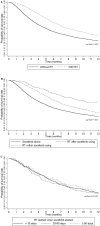Effect of radiotherapy on survival in advanced hepatocellular carcinoma patients treated with sorafenib: a nationwide cancer-registry-based study
- PMID: 33452421
- PMCID: PMC7810734
- DOI: 10.1038/s41598-021-81176-w
Effect of radiotherapy on survival in advanced hepatocellular carcinoma patients treated with sorafenib: a nationwide cancer-registry-based study
Abstract
Sorafenib is the standard treatment for advanced hepatocellular carcinoma (HCC) patients. This study aims to determine whether combining radiotherapy with sorafenib administration increases its efficacy. The study cohort included 4763 patients with diagnosed advanced HCC who received sorafenib between January 2012 and December 2015, as reported in medical records in the Taiwan Cancer Registry database. The effect of sorafenib with or without radiotherapy on survival was calculated using the Kaplan-Meier method and compared using the log-rank test. A Cox proportional hazards model was used for multivariate analysis. Patients receiving sorafenib plus radiotherapy had greater 1-year survival than did those receiving sorafenib alone (P < 0.001). Uni- and multivariate analyses also showed that radiotherapy increased survival after adjusting for confounders (adjusted HR 0.57; 95% CI 0.51-0.63). Further stratified analysis according to the timing of radiotherapy relative to sorafenib treatment revealed that patients who underwent radiotherapy after sorafenib had greater 1-year survival than did those undergoing radiotherapy within sorafenib use or sorafenib alone (adjusted HR 0.39; 95% CI 0.27-0.54). Combined treatment with sorafenib and radiotherapy results in greater HCC patient survival and should be considered an option for treating this challenging disease.
Conflict of interest statement
The authors declare no competing interests.
Figures


Similar articles
-
Adoption of single agent anticancer therapy for advanced hepatocellular carcinoma and impact of facility type, insurance status, and income on survival: Analysis of the national cancer database 2004-2014.Cancer Med. 2021 Jul;10(13):4397-4404. doi: 10.1002/cam4.3985. Epub 2021 May 31. Cancer Med. 2021. PMID: 34060249 Free PMC article.
-
Efficacy and safety of selective internal radiotherapy with yttrium-90 resin microspheres compared with sorafenib in locally advanced and inoperable hepatocellular carcinoma (SARAH): an open-label randomised controlled phase 3 trial.Lancet Oncol. 2017 Dec;18(12):1624-1636. doi: 10.1016/S1470-2045(17)30683-6. Epub 2017 Oct 26. Lancet Oncol. 2017. PMID: 29107679 Clinical Trial.
-
Survival and cost-effectiveness of sorafenib therapy in advanced hepatocellular carcinoma: An analysis of the SEER-Medicare database.Hepatology. 2017 Jan;65(1):122-133. doi: 10.1002/hep.28881. Epub 2016 Nov 25. Hepatology. 2017. PMID: 27770556
-
Sorafenib combined with radiofrequency ablation as treatment for patients with hepatocellular carcinoma: a systematic review and meta-analysis.J BUON. 2017 Nov-Dec;22(6):1525-1532. J BUON. 2017. PMID: 29332348
-
Efficacy and safety of selective internal radiotherapy versus sorafenib for intermediate-locally advanced hepatocellular carcinoma: a systematic review and meta-analysis.Expert Rev Gastroenterol Hepatol. 2019 Mar;13(3):271-279. doi: 10.1080/17474124.2019.1570135. Epub 2019 Jan 25. Expert Rev Gastroenterol Hepatol. 2019. PMID: 30791765
Cited by
-
2022 KLCA-NCC Korea practice guidelines for the management of hepatocellular carcinoma.J Liver Cancer. 2023 Mar;23(1):1-120. doi: 10.17998/jlc.2022.11.07. Epub 2022 Dec 9. J Liver Cancer. 2023. PMID: 37384024 Free PMC article. Review.
-
Current perspectives on radiotherapy in hepatocellular carcinoma management: a comprehensive review.J Liver Cancer. 2024 Mar;24(1):33-46. doi: 10.17998/jlc.2024.02.26. Epub 2024 Mar 25. J Liver Cancer. 2024. PMID: 38523467 Free PMC article.
-
Inactivation of EGFR/ERK/NF-κB signalling associates with radiosensitizing effect of 18β-glycyrrhetinic acid on progression of hepatocellular carcinoma.J Cell Mol Med. 2023 Jun;27(11):1539-1549. doi: 10.1111/jcmm.17760. Epub 2023 May 12. J Cell Mol Med. 2023. PMID: 37177859 Free PMC article.
-
Impact of Intrahepatic External Beam Radiotherapy in Advanced Hepatocellular Carcinoma Patients Treated with Tyrosine Kinase Inhibitors.Liver Cancer. 2023 Feb 10;12(5):467-478. doi: 10.1159/000529635. eCollection 2023 Oct. Liver Cancer. 2023. PMID: 37901765 Free PMC article.
-
Tyrosine-kinase inhibitor combined with iodine-125 seed brachytherapy for hepatocellular carcinoma refractory to transarterial chemoembolization: a propensity-matched study.Cancer Imaging. 2023 Sep 25;23(1):91. doi: 10.1186/s40644-023-00604-4. Cancer Imaging. 2023. PMID: 37749616 Free PMC article.
References
Publication types
MeSH terms
Substances
LinkOut - more resources
Full Text Sources
Other Literature Sources
Medical

